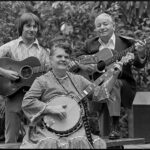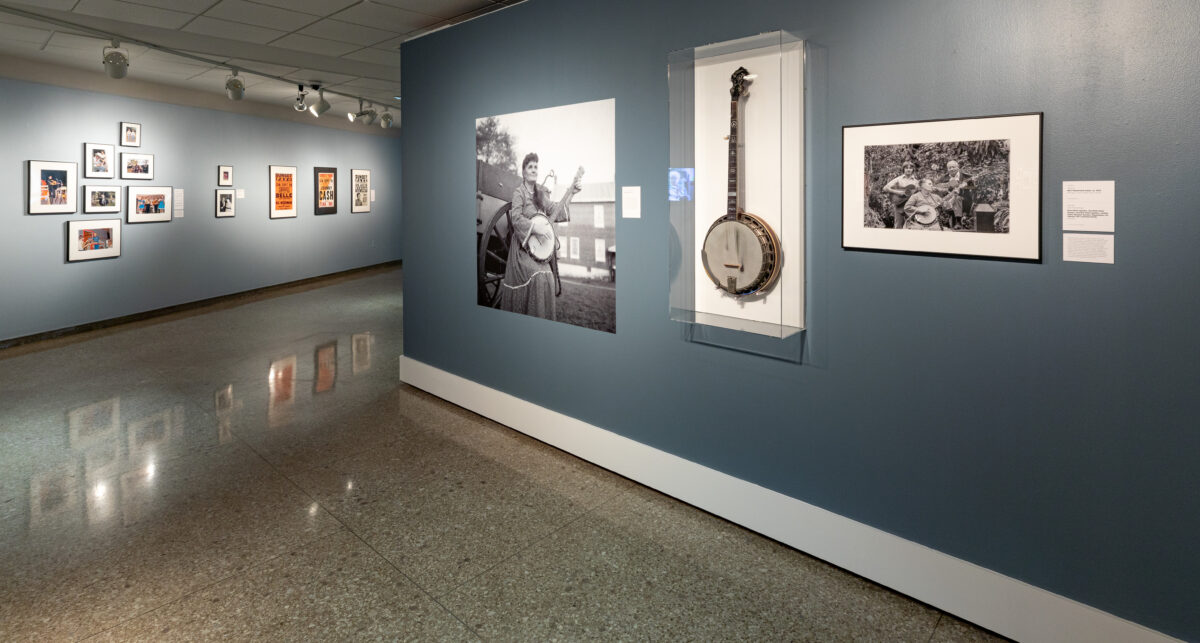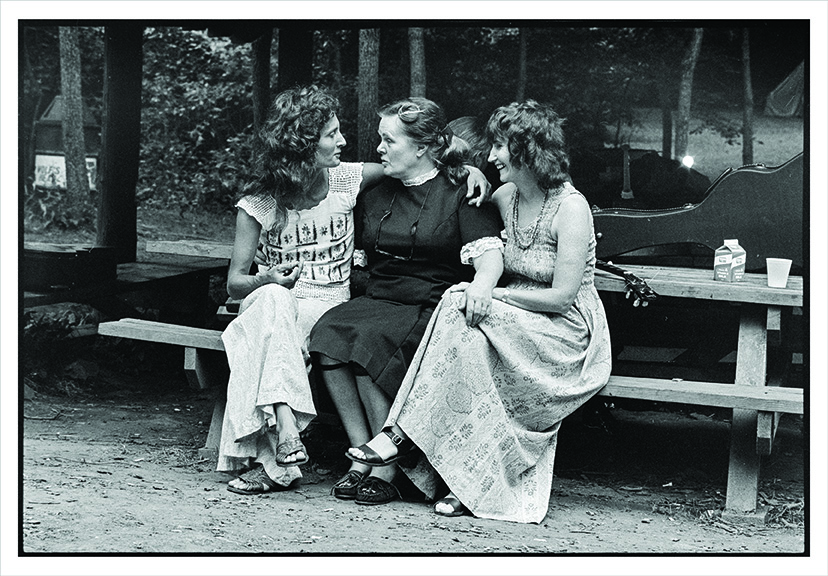
New exhibit showcases Appalachian music legend in memorabilia, music, and film
Ask your favorite old-time music aficionado to name the most important musicians working in the 20th century, and odds are you’re going to hear Ola Belle Reed’s name.
A singer/songwriter who rose to national prominence in the 1960s performing traditional Appalachian music with her powerful voice and signature clawhammer banjo, Reed’s songs (including “High on the Mountain” and “I’ve Endured”) are now considered part of the country and folk canon. High profile artists regularly pay tribute to Reed; Robert Plant and Alison Krauss covered Reed’s “You Led Me to the Wrong” for their 2021 collection Raise the Roof. While Reed is now widely recognized among the most influential bluegrass and folk musicians, it was not always the case.
“It was incredibly difficult for a woman singer/songwriter in the ‘60s to get their work out and be heard,” says media and communication studies Professor Bill Shewbridge ’80, history, who is completing a documentary on Reed’s legacy. “Her music is still very relevant today. It’s very much of her time, but she speaks to our time as well, often in really profound ways.”
A new exhibition, Ola Belle Reed: I’ve Endured, on view at the Albin O. Kuhn Library Gallery at UMBC through June 30, traces and contextualizes Reed’s achievements through the lens of her migration from her Southern roots to the mid-Atlantic states where she rose to renown. Drawn from UMBC’s Maryland Traditions Archive, the exhibition collects photographs, concert flyers, instruments, audio, video, and memorabilia spanning Reed’s career. Ola Belle Reed: I’ve Endured is co-curated by Shewbridge with curator of exhibitions Emily Cullen and music scholar Tim Newby (Baltimore: The Hard Drivin’ Sound & its Legacy).
 Ola Belle Reed: I’ve Endured is on show at UMBC’s Albin O. Kuhn Library Gallery through June 30. Photo courtesy of Research Graphics at UMBC.
Ola Belle Reed: I’ve Endured is on show at UMBC’s Albin O. Kuhn Library Gallery through June 30. Photo courtesy of Research Graphics at UMBC.
Tributes in Film and Performance
The exhibition will also feature special events, including a concert and a preview screening of Shewbridge’s work-in-progress documentary, I’ve Endured: The Music and Legacy of Ola Belle Reed. The documentary screens May 11 at 5 p.m. in the AOK Library Gallery. The screening is free and open to the public, followed by a reception.
“A lot of her story hasn’t been told,” says Shewbridge. “When I started, I thought this was going to be a 15 minute film, but it’s now 45 minutes. I didn’t think it would be hard to breathe life into this, and it’s still evolving.”
Featuring some 17 interviews with musicians, scholars, and Reed’s contemporaries, the documentary is nearing completion. Shewbridge expects to add footage before calling the film complete and sending it on the festival circuit in the coming months—including footage from the upcoming tribute concert to be held June 2 in Earl and Darielle Linehan Concert Hall.
Musicians and family members who worked with Reed will join an all-star band to celebrate Reed’s musical legacy. This special event will be free and open to the public, and will feature music by Cathy Fink & Marcy Marxer, The Honey Dewdrops, Hugh Campbell, and Dave Reed, with remarks from Cliff Murphy, director of the Smithsonian’s Center for Folklife and Cultural Heritage.
For those yearning for more, Shewbridge says there is no shortage of material about Reed available.
“We dug up a lot, and there is so much that never made it into the film. We put a lot of extra material online,” he says. Indeed, the Ola Belle Reed Project website contains hours of footage, including interviews, live music performances, and vintage clips.
 Alice Gerrard, Ola Belle Reed, and Hazel Dickens at the Brandywine Mountain Music Convention, Chadds Ford, Pennsylvania, 1974. Courtesy of Carl Fleischhauer.
Alice Gerrard, Ola Belle Reed, and Hazel Dickens at the Brandywine Mountain Music Convention, Chadds Ford, Pennsylvania, 1974. Courtesy of Carl Fleischhauer.
Reed’s Enduring Maryland Legacy
Reed’s musical journey began the 1930s, when she joined the North Carolina Ridge Runners. As a teenager, in the wake of the Great Depression, Reed left her Appalachian home to resettle in the North—first in Pennsylvania, and then Maryland—bringing her music with her. During this time, an estimated two million migrants left Appalachia to find work in northern industrial centers, bringing along cultural and musical traditions that helped shape the cultures of their adopted homes.
By the 1950s, she was working with a new band, The New River Boys; and meanwhile she and her brother Alex founded and operated popular country music parks, including the famed New River Ranch in Rising Sun, Maryland. Their parks hosted the biggest names in country music, including Johnny Cash, Ernest Tubb, Bill Monroe and the Louvin Brothers, not to mention Hank Williams and Dolly Parton, drawing faithful audiences from D.C., Pennsylvania, Baltimore, and beyond.
As the folk revival of the 1960s gained steam, Reed broke out as a solo artist and began to make her name known. And like many folk singers of the era, Reed was devoted to advancing social justice and civil rights causes via her music.
“She was very interested in social justice,” Shewbridge says. “In the film, Marcy Marxer characterizes her as a civil rights songwriter. So many of her works are about the community and bringing people together.”
Before Reed passed in 2002, she had been awarded an honorary doctorate from the University of Maryland, an NEA National Heritage Fellowship, and a Distinguished Achievement Award from International Bluegrass Music Association. In 2019, the Library of Congress added her 1973 album Ola Belle Reed to the National Recording Registry, securing her legacy for generations to come.
* * * * * *
Learn more about UMBC’s Ola Belle Reed: I’ve Endured exhibit and related programming. The exhibit will be on view at the Albin O. Kuhn Library Gallery through June 30. The premiere screening of the 45-minute documentary “I’ve Endured”: The music and legacy of Ola Belle Reed will be held May 11 at 5 p.m. “I’ve Endured,” a concert honoring the music and legacy of Ola Belle Reed, will be held on June 2 at 8 p.m. in Linehan Concert Hall.





